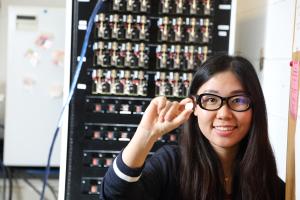Energy & the Environment Research

Core Faculty

Robert J. Davis
Davis joined the faculty in Chemical Engineering at the University of Virginia in 1990 as an assistant professor, was promoted to associate professor in 1996, and full professor in 2002.

Jason Bates
Bates research group synthesizes catalysts with well-defined structures and use quantitative kinetic measurements and characterizations of their active centers to elucidate structure–reactivity relationships.

Geoff Geise
Geoffrey M. Geise is an associate professor at the University of Virginia with appointments in chemical engineering and materials science and engineering (by courtesy). At UVA, his research focuses on studying the fundamentals of chemically- and electrochemically-driven small molecule transport in polymeric membranes for clean water and energy.

Roseanne M. Ford is a Professor of Chemical Engineering at the University of Virginia. She holds a B.S. degree from the University of Delaware and a Ph.D. from the University of Pennsylvania, both in chemical engineering.

Joshua J. Choi
Joshua Choi joined UVa in 2014 and is a recipient of a NASA Early Career Faculty Award (2015). His research group is developing novel and advanced synthetic methods to achieve robust heterostructure formation, surface structure and impurity doping. They seek to understand and control the structure-property relationships in these materials.

Gary Koenig
We are interested in the tailored synthesis of new materials at multiple length scales. At the molecular scale, the physical properties of materials are largely dependent on the stoichiometry and stable structures that can be formed.
Related Labs
-
Biorenewable Conversion Research in the Davis Group
Thermochemical and Electrochemical Catalysis for Decarbonization in the Bates Group
Polymer Membranes for Water and Energy in the Geise Group
Bioremediation Research in the Ford Group
Solar Energy Research in the Choi Group
Energy Storage Research in the Koenig Group

